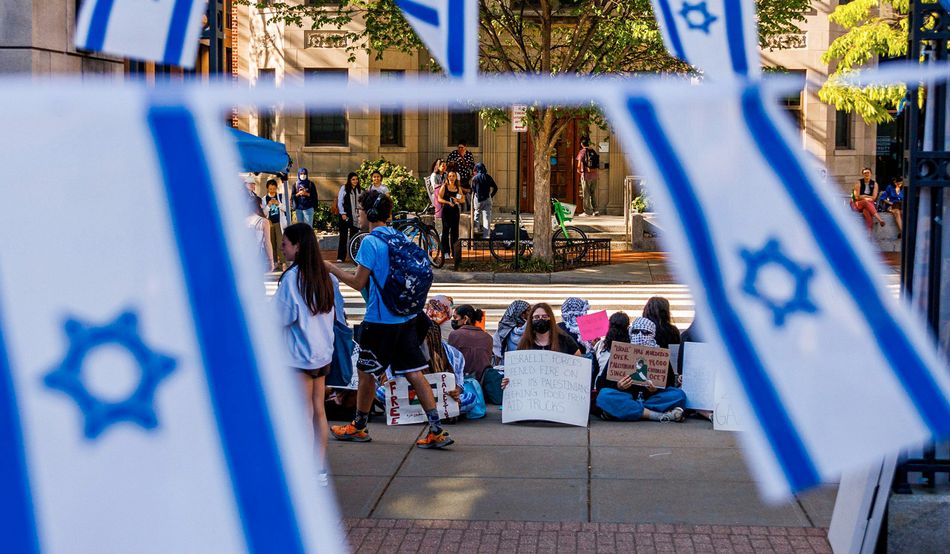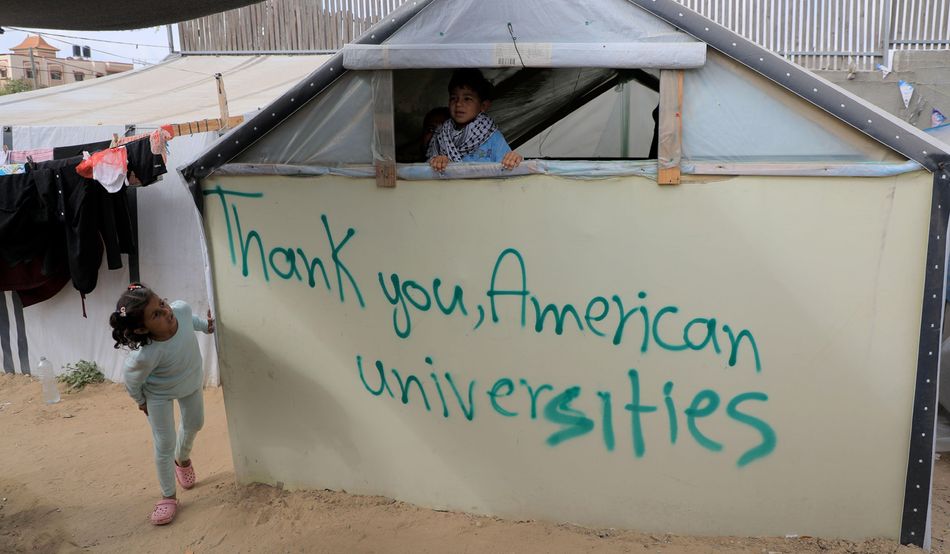And just like that…the stereotype changed. Until very recently, gen Z, including students in western countries, were being lambasted as sheltered “snowflakes” lacking in drive and ambition, too invested in safe spaces to engage with uncomfortable ideas or exert themselves in challenging directions. Now the problem seems to be that these same young people are not willing to be pacified by either comforting pap or complacent indifference to injustice. They’ve rejected the soothing belief that things are as they should be and that our political leaders have nothing but the best intentions.
As campus protests against Israel’s war on occupied Gaza spread across the United States over the last several days, participating students have been transformed by their detractors into nothing less than enemies of the state, seeking the downfall of western civilisation itself. One liberal pundit harrumphed that students have been indoctrinated by those three rather random witches—critical theory, postcolonial studies and identity politics—who have ruined the western university. In another familiar deflection, students protesting lethal violence inflicted by the heavily armed and well-funded state of Israel on tens of thousands of trapped Gazan civilians are also accused of being antisemitic, despite a number of Jewish students being among them and vociferously refusing violence inflicted in their name.
No less startling was the response to these sit-ins from university authorities at dozens of universities. Within hours of setting up their “encampments” (tents) on campus quadrangles and lawns, most famously at Columbia University in New York, students on several campuses found themselves subjected to ferocious and manifestly disproportionate repression: security forces deployed using excessive force, arrests, evictions, teargassing, pepper-spraying, suspensions, tasering, campus bans, threats of disciplinary action and, in some cases, armoured vehicles, snipers and heavily armed riot police. It is not inconceivable that one of these many guns is actually fired before too long and yet another American tragedy ensues.
Alongside students, some of their professors have also received warnings and threats of disciplinary action from their employers for standing alongside or even just in the vicinity of their students. They too have been arrested and roughed up, some, ironically for asking why such excessive force was being used against students. One viral video from Emory University in Atlanta, Georgia shows a female economics professor being thrown to the ground by two burly male police officers and handcuffed as her spectacles fall off.
In an ironic reversal of the usual charge levied against students, the demand for “safe spaces” now comes from the authorities
The heavy-handed and seemingly co-ordinated responses from university authorities might have shown a more familiar logic if what was taking place could conceivably be shoehorned into the category of a “riot” or even some kind of violent disorder. Given the overwhelmingly peaceful and well-organised nature of the protests, to which media and eyewitness reports testify, universities and police forces are coming up with bizarre charges such as “defiant trespass”, activated within seconds of ordering people to leave the area. In an instant, what normally should and does function as shared community space is turned into exclusive private property so that its ordinary occupiers can be criminalised, their records smudged forever.
No very good reasons have been provided for this level of repression. Instead, in an ironic reversal of the usual charge levied against students, the demand for “safe spaces” now comes from the authorities who claim encampments and sit-ins render universities unsafe—although it is unclear quite how.
Over the last days, I’ve visited a sit-in at Princeton University in New Jersey where arrests were made within minutes of tents going up. While police immediately had the tents removed, the sit-in itself continues and grows. There are mounds of pillows and blankets, food supplies, over-the counter-medicines and a small “library” shelf full of books. Protesters sit around chatting, drawing, reading, working on their laptops or listening to visiting speakers.
At each visit, I have been struck not only by the peaceability—and affability—of those present but also the extraordinary attention and labour given to creating determinedly inclusive and community-oriented spaces. There is a vision of university communities as they should be that many managers might do well to learn from. Posted guidelines underline the right to adhere to different beliefs and faiths while holding a “shared humanity” within that diversity. They also enjoin “no littering”, no drug or alcohol use, and respect for personal boundaries. To ensure that no untoward face-offs take place, protesters are also asked not to engage with counter-protesters, of whom there are a small number. Shabbat dinners are held at the camp, as are Islamic prayers. I attended a Christian Sunday service at which the journalist and ordained minister, Chris Hedges, also preached a stirring sermon that put defying injustice at the heart of what such protests strive for, reminding his listeners of the duty to refuse complicity and to insist that it was “better to suffer wrong than do wrong.”
A profoundly moral and purposive refusal is at the heart of these campus uprisings. It is a refusal to be complicit in the injustice of the horrifying ethnic cleansing largely funded and armed by the United States government which is now also seeking to protect Israeli leaders from prosecution for war crimes by the International Criminal Court. It is a refusal by the young to mirror the supine posture of so many of their elders, including university managers, as every single one of Gaza’s twelve universities has been wantonly and deliberately bombed, some badly damaged and others reduced to rubble. There are no stirring statements of concern this time around, still less offers of support for “scholars at risk” even as many academics, including internationally known scholars, in Gaza have perished. Relatively few western academics have spoken up against this “scholasticide” and certainly no university leaders.
Students are refusing this reprehensible silence. The sit-ins, growing by the minute are also a refusal by young people to occupy the position of helplessness that many well-intentioned voters understandably feel as governments ignore clear popular majorities for a ceasefire and for an end to the violence. Theirs is a refusal to treat morality as a pretty slogan without any bearing on our institutions and how they are funded.
The refusal to put up with business as usual has resulted in clear-sighted and ethically robust demands, though the details may vary with institutions and groups. For the most part, protesting students are asking that their institutions, many of which have vast investment portfolios for their huge endowments, to disclose their holdings and then to divest from weapons and technology manufacturers with ties to the Israeli military. These include companies such as BAE Systems, Lockheed Martin, and Raytheon as well as Amazon and Alphabet, Google’s parent company.
They want their universities, to whom they pay fees, to delink from the killing fields of Gaza. They want the leaders of their institutions to join calls for a ceasefire, bringing an end to the relentless slaughter we have been watching on our screens, and for the hostages to be returned to their families. Many are also calling for universities to participate in boycott, divestment and sanctions (BDS) against Israel; in this they echo a prior generation of students who called for precisely such measures against apartheid South Africa—with eventual success, bringing apartheid to an end. Boycotts and divestment are tried and tested tools of bringing about non-violent change while sanctions are regularly used against governments which break international law, as Israel has multiple times. There is little point in condemning violence issuing from occupied regions if there is no willingness to bring powerful non-violent measures to bear upon occupiers and their violence.
The protests have succeeded in showing Gaza—and the rest of the world—that many Americans are horrified at what is being enacted in their name and with their money
While the demands are, of course, important, the success or failure of the protests does not rest on them. The truth is that the protests have already succeeded. They have drawn the attention of the country and the world beyond to the profound inadequacies and falsehoods of a media narrative that has, by and large, failed to hold powerful politicians and lobbies to account. Whether they are lauded or denounced, protesters have made clear that the United States’ policy of aiding and abetting industrial-scale slaughter by Israel using vast sums of American taxpayers’ money is not with the unanimous consent of its citizenry.
The protests have succeeded in showing Gaza—and the rest of the world—that many Americans are horrified at what is being enacted in their name and with their money, and they want it to stop. The United States of America is no more a monolith than anywhere else, however much consensus politicians manufacture amongst themselves and try to enforce on their citizenry through an acquiescent media.
The protests have also succeeded in one other important way, if a depressing one. They have shown all of us that brutality wielded outwards can and will be turned inwards in a split second. A heavily militarised state which uses or abets the use of force against civilians elsewhere is no respecter, ultimately, of its own civilians. The willingness to unleash armed personnel and weapons on young people and their professors has thrown light on a glaring democratic deficit, one that was already evident in state policy but now takes the form of punitive measures against dissenters.
It also reminds us, as historian Asheesh Kapur Siddique shows, that far from being left-wing indoctrination camps, American universities are run by trustees and boards filled with bankers, financiers and corporations, most of whom are on the political right. The repression of these protests has thrown light on the grim reality of a hollowed-out democracy and a routine authoritarianism which is more deeply and dangerously embedded than can be conveniently pinned on one political party or a single figure like Donald Trump.
“Free speech” was always conditional on not being properly threatening to the status quo
Some have rightly pointed to the “Palestine exception” for free speech on campus, but the levels of repression we are seeing also indicate that “free speech” was always conditional on not being properly threatening to the status quo. This is why many of the usual voices claiming to support free speech have been remarkably silent on the ongoing repression of protest. It is also too easy to look at this appalling repression and think it a mistake on the part of higher education managers. It is not. It is intended to send the message, loud and clear, that on matters of material import to the powers that be—such as profiting from death-dealing weapons—dissent will not be tolerated.
Students in the United States—and now also in Canada—are standing up to be counted when it matters very much that all people of conscience do so. They are taking action in the most peacefully disruptive ways at a time when clichéd stories need to be challenged. They know that “power concedes nothing without a demand.” Of those who claim to be liberal but are against these protests, the great American abolitionist Frederick Douglass might say: “Those who profess to favor freedom and yet deprecate agitation are men who want crops without plowing up the ground; they want rain without thunder and lightning. They want the ocean without the awful roar of its many waters.” As today’s elders imagine that in Douglass’s time and in subsequent terrible moments, they would have stood against oppression, we are extremely fortunate that so many in the next generation are willing to actually do so. Stand with them.














